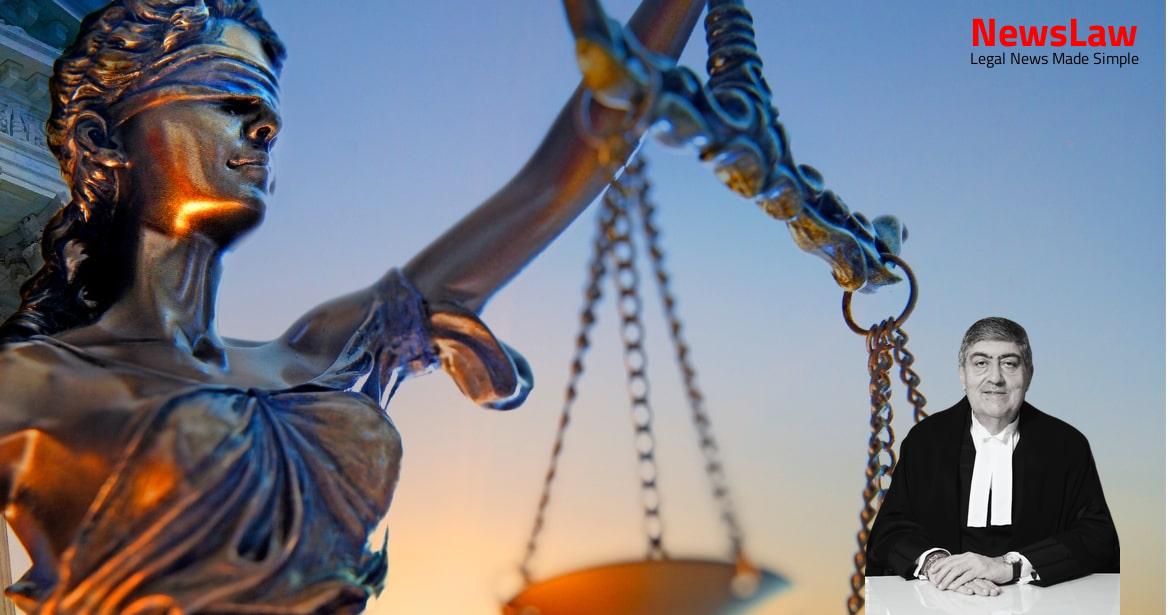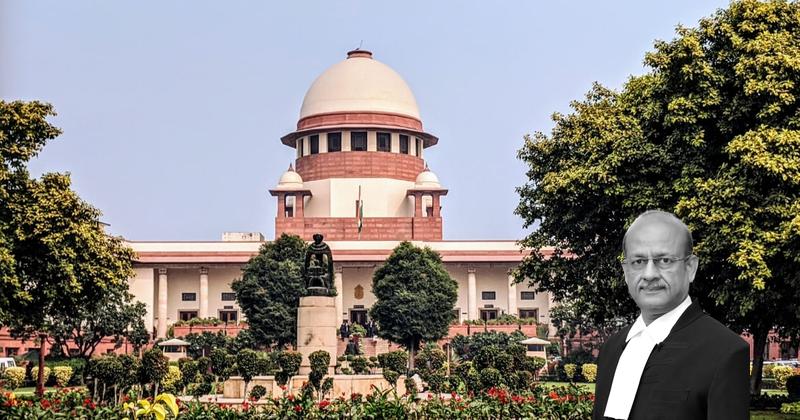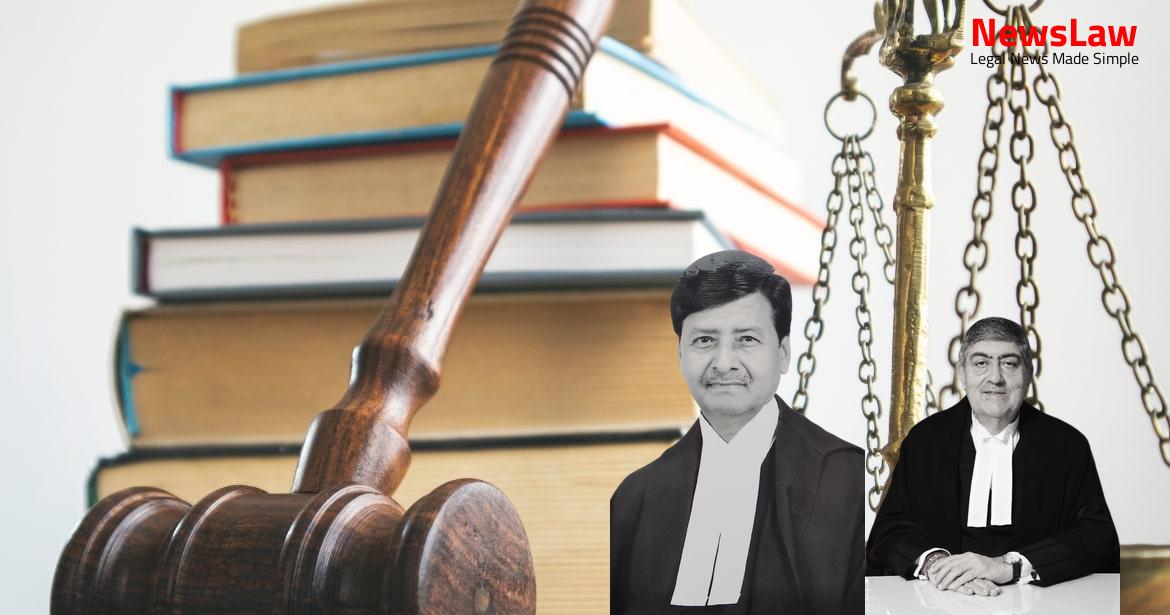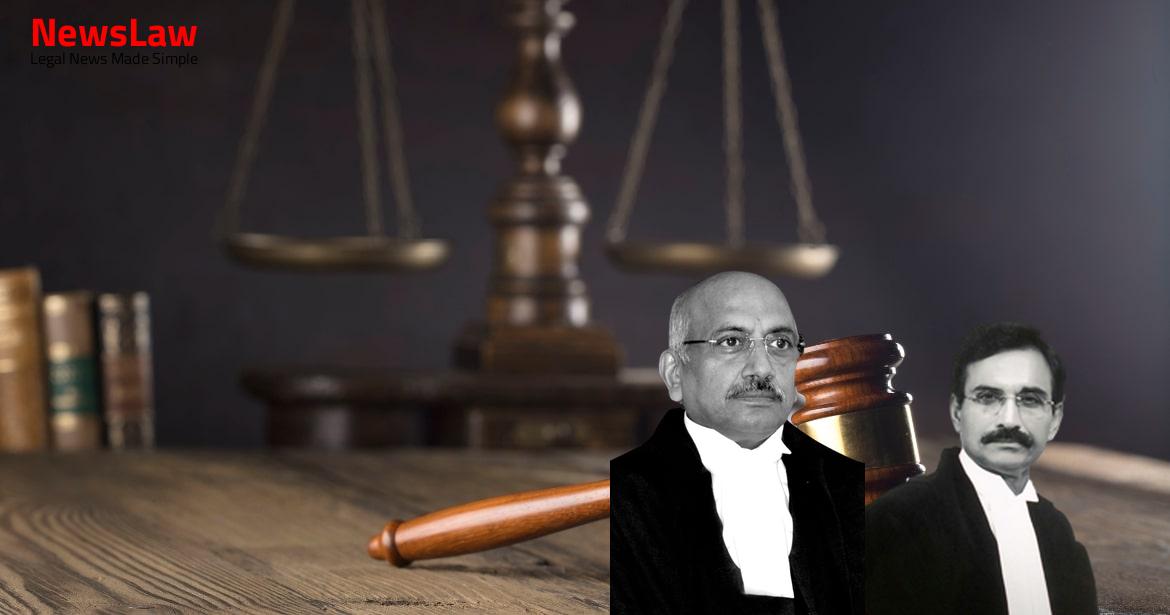Delve into the intricate legal analysis surrounding benefit of doubt in determining appointment eligibility, particularly in cases involving acquittal in criminal charges. The court’s thorough examination of the nature of the offence and the concept of ‘honourable acquittal’ provides valuable insights into the complexities of such decisions. Stay tuned to discover how legal principles guide judgments in delicate situations like these.
Facts
- The respondent was initially found ineligible for appointment due to serious criminal offences against them.
- The matter was remitted back to the Superintendent of Police for a fresh decision.
- Fresh orders were passed holding the respondent ineligible again.
- The respondent challenged the decision in a writ petition and was found eligible based on lack of evidence linking them to the offence.
- The judgment of Director General Police, Rajasthan Circular No.1687 dt.29.4.1995 was upheld as legal.
- The respondent was given the benefit of doubt and deemed eligible for the constable position.
- The appeal was dismissed based on the earlier judgments and the benefit of doubt given to the respondent.
- Recruitment criteria included disqualification for those convicted of moral turpitude offences.
- Candidates were deemed eligible if found not guilty, acquitted by court, discharged on compromise basis, or given benefit of certain acts.
- The Court expressed dissatisfaction with the authority not applying directions given in previous orders.
- The incident occurred on 6.10.2008 at about 6 p.m. when Jagdish and Dayaram came in a tractor to till a disputed field in jungle Patan.
- Tofli, the mausi of Babulal, forbade them to till the land and stayed back in the field.
- Babulal, Raju, Om Prakash, and Dinesh rushed to her side but were beaten by Dayaram, Love Kush (respondent), Bodan, and Jagdish.
- Police registered Case No.255 of 2008 under Sections 302, 341, 323, 34 of the IPC and commenced the investigation.
- The charges were framed, and all the accused denied the charges.
- During the trial, injured persons filed a compromise in favor of the accused under Sections 341, 323 of IPC, which was approved.
- All prosecution witnesses, including the injured, turned hostile during the trial, leading to a lack of conclusive evidence against the accused.
- The respondent’s participation in the incident was acknowledged, but there was no concealment of this fact, as the respondent had disclosed it during the recruitment process.
- The respondent was found ineligible for appointment based on a circular dated 28.03.2017 due to the involvement in the described incident.
Also Read: Supreme Court Judgment on Single Till Mechanism for HRAB Calculation: A Comprehensive Analysis
Issue
- The issue at hand pertains to whether the respondent, who was acquitted in a case charged under Sections 302, 323, 341/34 of the Indian Penal Code, can be appointed as a constable in the Rajasthan Police service.
- The key question is whether the subsequent speaking order passed by the appellant authority on 23.05.2017 should be interfered with in light of the factual matrix and judicial pronouncements.
- The crux of the matter is whether the benefit of doubt resulting in the respondent’s acquittal creates an opportunity for their appointment, considering the seriousness of the charges they were acquitted of.
Arguments
- The petitioner has contended that the respondent was about 19 years old at the time of the incident and has since succeeded in a competitive examination.
- Reference is made to Avtar Singh’s case regarding the consideration of government orders/rules during decision-making.
- An application for compounding was filed by the respondent.
- Counsel for the respondent cited a judgment where the candidate was charged prior to clearing an examination, emphasizing the scarcity of employment opportunities.
- The time lapse between the alleged offense and the recruitment process was highlighted.
- Compounding was found permissible for offenses under specific sections of the IPC.
- The Trial Court held that the prosecution failed to prove the charges against the candidate in this case.
- Reference is made to the judgment in Avtar Singh v. Union of India & Ors. for detailed parameters in such cases.
- The concept of ‘honorable acquittal’ was discussed in relation to the candidate’s case.
- The compromise between the complainant and the respondent was noted within a short period after the affidavit was tendered.
- Entry into the police service required candidates to have good character and clean antecedents.
- Acquittal in a criminal case does not automatically entitle a candidate to appointment.
- Reference is made to the State of Madhya Pradesh & Ors. v. Abhijit Singh Pawar case regarding disqualification of a candidate for police posts.
- The date of decision was deemed crucial as per Avtar Singh’s case for considering acquittal in criminal cases.
- The rejection of candidature based on a pending case was upheld.
- The argument that deletion of a name would result in stigma was deemed unsustainable as the candidate was acquitted.
- Distinctions were sought in various judgments based on factual matrices.
- Employers have the right to consider antecedents and suitability of candidates even after disclosure.
- The severity of charges and the nature of acquittal were deemed important in such considerations.
Also Read: Selection and Appointment of Judicial Officers in Himachal Pradesh
Analysis
- Employers must consider government orders/instructions/rules applicable to the employee when making decisions.
- If an employee is acquitted in a case involving moral turpitude or serious offenses, the employer can take into account all relevant facts about the antecedents and make an appropriate decision on the employee’s continuation.
- If the acquittal was on technical grounds and not a clean acquittal, or if benefit of reasonable doubt was given, employer discretion is allowed.
- Nuancess of this judgment have been considered in subsequent judgments.
- The expression ‘honourable acquittal’ was also discussed in the case of Union Territory, Chandigarh Administration & Ors. v. Pradeep Kumar & Anr.
- In Avtar Singh’s case, it was considered an honourable acquittal and relief was granted to the candidate.
- Judgment highlighted that acquittal based on reasonable doubt in heinous or serious crimes does not make the candidate eligible.
- Reference was made to Rajasthan High Court judgments where relief was granted to candidates acquitted on benefit of doubt.
- Mention of a Supreme Court order dated 21.01.2020 where an SLP was dismissed against a candidate’s appointment based on benefit of doubt in a criminal case.
- The dispute was aimed at settlement, not with the job in mind.
- Compoundable offences were first compounded during the trial.
- Witnesses turned hostile for the offence under Section 302/34 IPC, which could not be compounded.
- The issue of the circular dated 28.03.2017 being applicable was res integra due to the earlier order.
- The order dated 14.05.2018 was not a judgment but mentioned dismissal based on the given facts and circumstances.
- The person who ran the tractor over the deceased was one of the co-accused.
- The role of the respondent was not that of a mere bystander but involved in the alleged attack with knives.
- The terminology of benefit of doubt was rightly used by the Judge in the given circumstances.
- An examination of the controversy depends on the nature of the offence charged and the outcome.
- The view of the Court varied based on the nature of the offence and the evidence presented.
- A clean acquittal based on total absence of evidence is crucial in criminal jurisprudence to grant the benefit of doubt to the accused.
- The circular dated 28.03.2017 is wide in its application, giving benefit to acquitted candidates.
- Despite the circular, previous judicial pronouncements state that benefit of doubt does not entitle a candidate for appointment.
- The decision dated 23.05.2017 is not in violation of the circular as it aligns with established legal principles.
- The impugned orders cannot be sustained, and the appellants were within their rights to issue the order on 23.05.2017.
Decision
- The appeal is allowed.
- The impugned judgment of the Division Bench dated 16.07.2019 and learned Single Judge dated 14.05.2018 are set aside.
- Parties are left to bear their own costs.
Case Title: THE STATE OF RAJASTHAN Vs. LOVE KUSH MEENA (2021 INSC 208)
Case Number: C.A. No.-003894-003894 / 2020



